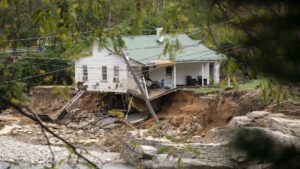Title: Uncovering Hidden Risks: How Climate Data is Transforming Home Buying Decisions
At Extreme Investor Network, we aim to provide unique insights and valuable information to our readers. Today, we’re diving into the world of real estate and how new risk-assessment technology is reshaping the way homebuyers perceive climate risks.
Hurricane Helene left a devastating mark on North Carolina, with insured losses estimated at over $6 billion. However, the uninsured losses tell a different story, especially for homeowners without flood insurance. The majority of homes affected by the storm did not have flood insurance, highlighting the need for better risk assessment tools.
Enter First Street, a climate risk firm that is revolutionizing the way we evaluate property risks. By incorporating the effects of climate change into its risk scores, First Street is shedding light on the true flood risk faced by homeowners, even if they are not in FEMA-designated flood zones.
Now, thanks to a partnership with Zillow, First Street’s climate risk data is available for every for-sale property listed on the platform. This means that buyers and sellers can access property-specific climate data to make informed decisions about their real estate transactions.
Skylar Olsen, chief economist at Zillow, emphasized the importance of considering climate risks in home buying decisions. As concerns about flooding, extreme temperatures, and wildfires escalate, having access to this data empowers buyers, sellers, and agents to have meaningful discussions about long-term affordability and insurance needs.
But what sets First Street apart is its forward-looking approach. Their risk scores not only assess current risks, but also project those risks 15 and 30 years into the future — aligning with the standard lengths for fixed-rate mortgages. This long-term perspective is crucial, especially as climate change continues to intensify the severity of natural disasters.
With more than 80% of buyers now factoring in climate risk when purchasing a home, the impact on home values is becoming increasingly apparent. Properties with high climate risk may see a decrease in value as insurance costs rise, making it vital for buyers to understand the true risks associated with their potential investments.
Ultimately, by leveraging innovative tools like First Street’s climate risk data, homebuyers can make more informed decisions that not only protect their financial interests but also contribute to a more resilient and sustainable future. Stay tuned to Extreme Investor Network for more groundbreaking insights into the intersection of climate change and real estate investing.

